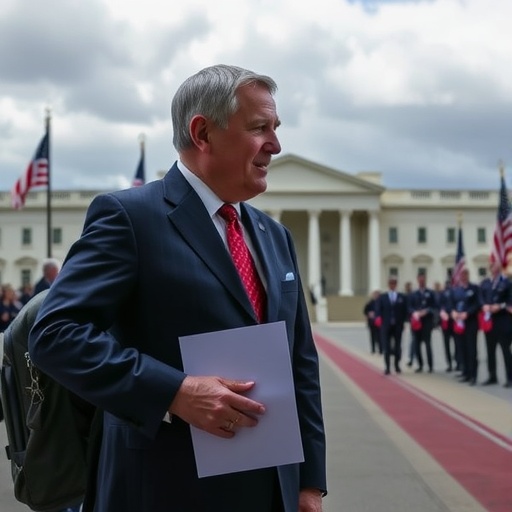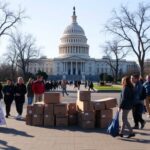Government Shutdown Crisis: Republican Congress Under Fire as Military Pay and Air Travel Hang in the Balance
As the government shutdown drags into its fourth week, the specter of unpaid military servicemembers and chaotic air travel disruptions has ignited nationwide fury, with critics blasting the Republican Congress for plunging the nation into political gridlock over the federal budget. Treasury Secretary Scott Bessent, a staunch defender of his party’s fiscal conservatism, insisted today that the impasse is necessary to curb excessive spending, even as the clock ticks toward a November 15 deadline that could leave over 1.3 million active-duty troops without paychecks.
- Treasury Secretary Bessent’s Fiery Defense Ignites Partisan Clash
- Military Paychecks in Peril: Servicemembers Brace for November 15 Cutoff
- Air Travel Chaos Escalates: FAA Systems on the Brink of Breakdown
- Unpacking the Federal Budget Standoff: From Border Walls to Spending Cuts
- Pathways to Resolution: Bipartisan Talks and Economic Fallout Loom Large
This unfolding crisis, unprecedented in its scope under unified Republican control of the White House and both chambers of Congress, has exposed deep fissures in the party’s approach to military funding and essential services. With Thanksgiving travel season looming, airlines report mounting delays, and families of deployed soldiers voice fears of financial ruin. The shutdown, triggered by disagreements on border security funding and domestic spending cuts, has already cost the economy an estimated $11 billion, according to the Congressional Budget Office, amplifying calls for immediate action.
Treasury Secretary Bessent’s Fiery Defense Ignites Partisan Clash
In a heated press conference at the Treasury Department this morning, Secretary Scott Bessent doubled down on the Republican stance, framing the shutdown as a principled stand against ‘reckless Democratic spending legacies.’ ‘We’re not going to mortgage our children’s future for bloated programs,’ Bessent declared, pointing to proposed cuts in non-defense discretionary spending as a path to fiscal responsibility. His words, delivered amid flashing cameras and shouted questions, underscored the administration’s resolve but did little to quell the growing backlash.
Bessent, a former hedge fund manager appointed for his Wall Street acumen, highlighted data from the Office of Management and Budget showing that federal outlays have surged 25% since 2020. He argued that without concessions on federal budget priorities like immigration enforcement, the shutdown could extend indefinitely. Critics, including Senate Minority Leader Chuck Schumer, fired back, calling Bessent’s comments ‘tone-deaf’ to the human cost. ‘While executives play politics, soldiers go hungry and travelers are stranded,’ Schumer tweeted, garnering over 500,000 likes in hours.
The secretary’s defense comes at a pivotal moment, as Republican leaders in Congress face internal divisions. House Speaker Mike Johnson has vowed to hold the line on spending caps, but moderate Republicans from swing districts are wavering, citing polls from Gallup that show 62% of Americans blaming the GOP for the impasse. This political gridlock has paralyzed routine operations, from national park closures to delayed Social Security checks, but it’s the threats to core services like military funding that have mobilized veteran groups and airline unions alike.
Military Paychecks in Peril: Servicemembers Brace for November 15 Cutoff
For the 1.3 million active-duty personnel across the Army, Navy, Air Force, Marines, and Space Force, the shutdown’s most visceral impact looms on November 15, when direct deposits for salaries could halt without congressional intervention. Pentagon officials confirm that while some essential operations continue under furlough exemptions, pay processing relies on appropriated funds frozen by the lapse. ‘We’ve prepared contingencies, but nothing replaces a paycheck,’ said Defense Secretary Lloyd Austin in a somber memo to troops last week.
Stories from the front lines paint a grim picture. Sergeant Maria Lopez, a 12-year veteran stationed at Fort Bragg, North Carolina, shared with reporters how the uncertainty is straining her family. ‘My husband works two jobs, but with bills piling up and no idea when pay will come, we’re dipping into savings we don’t have,’ Lopez said, her voice cracking during a virtual interview organized by the Military Officers Association of America. Similar sentiments echo from bases worldwide, where overseas deployments add currency conversion woes to the mix.
Historical precedents amplify the alarm: During the 2018-2019 shutdown, over 800,000 federal workers went unpaid, leading to a 10% spike in military food bank usage, per USDA data. This time, with Republican Congress holding the reins, advocates like the VFW are lobbying fiercely for prioritized military funding. ‘Our warriors deserve better than to be pawns in budget games,’ VFW National Commander Duane Thieman stated in a press release. Economists warn that delayed pay could ripple through local economies, with military towns like San Diego and Norfolk facing retail slumps of up to 15%, based on models from the Brookings Institution.
Amid the tension, bipartisan whispers of a short-term funding bill surface, but hardliners in the Freedom Caucus insist on tying any resolution to deeper federal budget reforms, prolonging the agony for those in uniform.
Air Travel Chaos Escalates: FAA Systems on the Brink of Breakdown
As holiday bookings surge, the Federal Aviation Administration’s air traffic control systems are buckling under shutdown strains, with over 2,000 controllers facing furloughs and mandatory overtime for those remaining on duty. The FAA, operating on borrowed funds since October 1, reports a 20% increase in near-miss incidents at major hubs like Atlanta and Chicago, per preliminary safety data leaked to aviation outlets.
Passengers are feeling the pinch firsthand. At Los Angeles International Airport, traveler David Ramirez missed a connecting flight after a two-hour delay attributed to understaffed towers. ‘I get politics, but stranding families during peak season? That’s unforgivable,’ Ramirez vented to local news crews, his frustration mirrored in viral social media clips amassing millions of views. Airlines for America, representing major carriers, estimates daily losses at $150 million, with Delta and United issuing waivers for affected routes.
The root of the air traffic control woes traces to sequestration-era underinvestment, exacerbated by the current lapse. FAA Administrator Mike Whitaker testified before a joint congressional hearing last week, warning that without full funding, ‘we risk a cascading failure in our skies.’ Quotes from pilots’ unions paint a dire scene: ‘Controllers are exhausted, working 10-hour shifts without relief,’ said Capt. Tim Canoll of the Air Line Pilots Association. Statistics from the DOT reveal that flight cancellations have doubled to 1,500 per week, hitting leisure and business travel alike.
In response, the Republican Congress has floated emergency appropriations for aviation safety, but these are entangled in broader political gridlock. Transportation Secretary Pete Buttigieg urged swift action, stating, ‘Air travel is the lifeblood of our economy—delaying fixes endangers lives and livelihoods.’ As winter storms approach, experts predict even greater disruptions, with the FAA’s contingency plans offering only band-aid solutions.
Unpacking the Federal Budget Standoff: From Border Walls to Spending Cuts
The shutdown’s origins lie in a tangled web of federal budget disputes, where Republican demands for $20 billion in border wall funding clash with Democratic pushes for expanded social services. President Trump’s administration, leveraging its trifecta control, has rejected compromise bills twice, citing insufficient offsets in non-military spending. ‘We can’t fund the future without securing our borders first,’ White House Press Secretary Karine Jean-Pierre echoed Bessent’s rhetoric during daily briefings.
Delving deeper, the impasse highlights chronic issues in federal appropriations. The last full-year budget passed in 2023 set defense spending at $858 billion, but ongoing resolutions have stalled upgrades to veteran healthcare and infrastructure. Nonpartisan analysts at the Bipartisan Policy Center note that political gridlock has led to 22 shutdown threats since 2010, costing taxpayers $75 billion cumulatively. This round, fueled by inflation concerns—with CPI at 3.2% year-over-year—sees Republicans eyeing a 10% trim in discretionary outlays, potentially axing $100 billion from education and environmental programs.
Stakeholders weigh in with stark warnings. The U.S. Chamber of Commerce, typically GOP-aligned, criticized the delay: ‘Businesses need stability, not shutdown roulette.’ Meanwhile, progressive think tanks like the Center on Budget and Policy Priorities argue that cuts disproportionately harm low-income families, projecting a 5% rise in poverty rates if the stalemate persists. Quotes from Capitol Hill reveal the human element: Rep. Nancy Pelosi (D-CA) lamented, ‘This isn’t governance; it’s gamesmanship at the expense of everyday Americans.’
Behind closed doors, negotiations intensify, with Senate Majority Leader Mitch McConnell mediating between factions. Yet, as midterms loom in 2026, electoral pressures may harden lines, turning the federal budget fight into a proxy war for party dominance.
Pathways to Resolution: Bipartisan Talks and Economic Fallout Loom Large
Looking ahead, the shutdown’s resolution hinges on fragile bipartisan talks, with a potential vote on a continuing resolution eyed for next week. House Republicans, under pressure from defense hawks, are considering a modular approach: isolated funding for military funding and air traffic control to avert immediate crises, while deferring thornier issues. ‘We can thread the needle if egos step aside,’ confided a senior GOP aide to Politico, signaling cautious optimism.
Yet, the economic toll mounts. Moody’s Analytics forecasts a 0.5% GDP hit if the shutdown extends to December, with ripple effects in consumer confidence already dipping to 98.7 on the University of Michigan index. For military families, advocacy groups push for ‘pay-for-performance’ guarantees, drawing on 2019 precedents where backpay was expedited. Aviation experts, meanwhile, call for long-term FAA modernization, estimating $1.5 billion in needed investments to prevent future bottlenecks.
As the November 15 military pay deadline approaches, public pressure surges through petitions and town halls. Veteran Sen. Tammy Duckworth (D-IL) rallied colleagues: ‘Let’s honor our commitments before it’s too late.’ If gridlock persists, analysts predict judicial interventions or executive orders, but these band-aids won’t heal the underlying political gridlock plaguing the Republican Congress. The nation watches, hoping for a breakthrough that restores normalcy to paychecks, flights, and faith in government.








